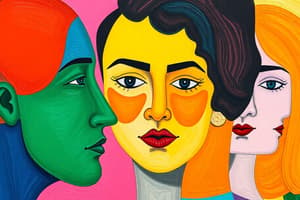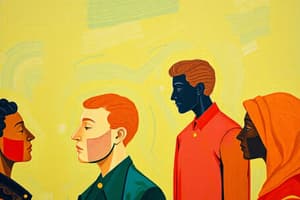Podcast
Questions and Answers
What is the primary contribution of inner processes to prejudice and stereotyping?
What is the primary contribution of inner processes to prejudice and stereotyping?
- They reduce negative attitudes
- They encourage superordinate goals
- They promote discrimination in reverse
- They contribute to scapegoat theory and self-serving bias (correct)
What is the key difference in the mental processes of nonprejudiced people?
What is the key difference in the mental processes of nonprejudiced people?
- They have a higher level of salience
- They have a lower level of confirmation bias
- They have a stronger self-serving bias
- They have a more conscious override (correct)
What is the primary goal of the jigsaw classroom technique?
What is the primary goal of the jigsaw classroom technique?
- To increase salience
- To promote scapegoat theory
- To reduce feelings of prejudice (correct)
- To encourage self-serving bias
What is the outcome of a prediction that ensures, by the behavior it generates, that it will come true?
What is the outcome of a prediction that ensures, by the behavior it generates, that it will come true?
What is the fear that one might confirm stereotypes that others hold?
What is the fear that one might confirm stereotypes that others hold?
What is the term for people claiming victim status because of moral, legal, or financial advantages?
What is the term for people claiming victim status because of moral, legal, or financial advantages?
What is the primary outcome of intergroup contact?
What is the primary outcome of intergroup contact?
What is the common outcome of being stereotyped?
What is the common outcome of being stereotyped?
What is the primary difference between prejudice and discrimination?
What is the primary difference between prejudice and discrimination?
What is the purpose of prejudice according to the content?
What is the purpose of prejudice according to the content?
What is the cognitive component of intergroup relationships?
What is the cognitive component of intergroup relationships?
What was the purpose of 'human zoos'?
What was the purpose of 'human zoos'?
What is a stereotype, according to the content?
What is a stereotype, according to the content?
What is the term for simultaneously holding egalitarian values and negative feelings toward people of other races?
What is the term for simultaneously holding egalitarian values and negative feelings toward people of other races?
What are the three components of intergroup relationships?
What are the three components of intergroup relationships?
What is the term for the tendency to sort objects into groups?
What is the term for the tendency to sort objects into groups?
What is the primary function of prejudice in the context of self-esteem?
What is the primary function of prejudice in the context of self-esteem?
What is the term for the bias that outgroup members are more similar to one another than ingroup members?
What is the term for the bias that outgroup members are more similar to one another than ingroup members?
What is the significance of 'not being last' in the context of prejudice?
What is the significance of 'not being last' in the context of prejudice?
What is the term for the excessive fear of homosexuals or homosexual behavior?
What is the term for the excessive fear of homosexuals or homosexual behavior?
What is an example of a group that is often disliked in communities where the majority of individuals are religious?
What is an example of a group that is often disliked in communities where the majority of individuals are religious?
What is the term for the affective based perception on differences among groups of people?
What is the term for the affective based perception on differences among groups of people?
What is the consequence of prejudice and discrimination against Arabs and Muslims since September 11, 2001?
What is the consequence of prejudice and discrimination against Arabs and Muslims since September 11, 2001?
What is the term for the research finding that there is a bias against admitting overweight students to college?
What is the term for the research finding that there is a bias against admitting overweight students to college?
Study Notes
Prejudice, Discrimination, and Stereotypes
- Prejudice: negative feeling toward an individual due to their group membership
- Discrimination: unequal treatment based on group membership
- Stereotype: cognitive beliefs that associate groups with traits
- Aversive racism: simultaneously holding egalitarian values and negative feelings toward people of other races
The ABC of Prejudice, Discrimination, and Stereotypes
- Affective component: prejudice
- Behavioral component: discrimination
- Cognitive component: stereotyping
Stereotypes and Socio-Cognitive Categorization
- Categorization: tendency to sort objects into groups
- Social categorization: sorting people into groups on the basis of common characteristics
- Outgroup members: people who belong to a different group or category than we do
- Ingroup members: people who belong to the same group or category as we do
- Outgroup homogeneity bias: outgroup members are more similar to one another than ingroup members
Prejudices and Subjective Perception
- Prejudice is an affective-based perception on differences among groups of people
- Includes racial prejudice (racism) and gender prejudice (sexism)
Common Prejudices and Targets
- Prejudice and discrimination against Arabs and Muslims has dramatically increased since September 11, 2001
- Atheists are disliked around the world in communities in which the majority of individuals are religious
- Bias against admitting overweight students to college
- Homophobia: excessive fear of homosexuals or homosexual behavior
What causes prejudice?
- Inner processes (e.g., emotions) contribute to prejudice and stereotyping
- Salience: being obvious or standing out
- Scapegoat theory: blaming misfortunes on outgroups contributes to negative attitudes
- Self-serving bias: taking credit for success but refusing blame for problems and failures
- Confirmation bias: focusing more on evidence that supports one's expectations than on evidence that contradicts them
Overcoming Stereotypes, Reducing Prejudice
- Conscious override: automatic system may sustain prejudices; conscious system can strive to overcome
- Mental processes of nonprejudiced people: difference lies in conscious system
- Discrimination in reverse: when people are accused of prejudice, they often exert themselves to prove the opposite
- Motives for overcoming prejudice: dedication to equality and social disapproval
- Contact: covert expressions of prejudice can be reduced by intergroup contact
- Superordinate goals: cooperating to achieve common goals is one powerful antidote to intergroup conflict
Impact of Prejudice on Targets
- No culture seems immune to stereotypes, prejudice, and discrimination
- Most have stereotypes; people dislike being stereotyped
- Self-fulfilling prophecy: prediction that ensures, by the behavior it generates, that it will come true
- Stigma and self-protection: social comparison, self-worth, and attribution theory
- Competitive victimhood: people may claim victim status because of moral, legal, or financial advantages
- Stereotype threat: fear that one might confirm stereotypes that others hold
- Self-defeating prophecy: prediction that ensures, by the behavior it generates, that it will not come true
Studying That Suits You
Use AI to generate personalized quizzes and flashcards to suit your learning preferences.
Description
Evaluate the differences between prejudice, discrimination, and stereotyping. Analyze the impact of stereotypes and discrimination on targets, and explore the innate versus cultural causes of prejudice.



